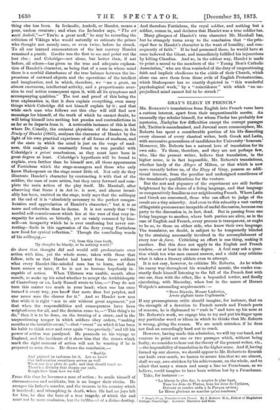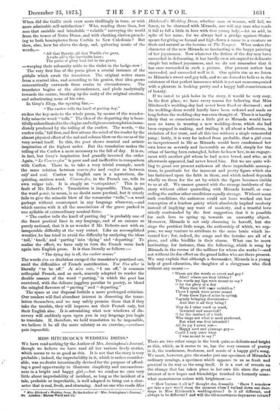GRAY'S ELEGY IN FRENCH.*
MR. ROBERTS'S translations from English into French verse have a curious interest, apart from their unquestionable merits. An unusually ripe scholar himself, for whom Pinder has probably few mysteries, 2Eschylus few difficulties except the corrupt passages left, Tacitus is macadamised, and Juvenal mere commonplace, Mr. Roberts has spent a considerable portion of his life dissecting every element of every classical writer, both Greek and Latin, with successive generations of candidates for University' honours.' Moreover, Mr. Roberts has a natural love of translation for its own sake. To those, therefore, and they are not perhaps kw, who, like the present writer, believe that translation, in the higher sense, is in fact impossible, Mr. Roberts's translations, whether lately of the Allegro of Milton, or that which is now more recently before us, of the Elegy of Gray, possess an addi. tional interest, from the peculiar and undesigned consilience of the translator's qualifications for the venture.
But the zest and piquancy of the experiment are still further heightened by the choice of a living language, and that language so comparatively familiar as our neighbouring French. Where Latin and Greek are concerned, those who can affect to judge of the result are a tiny minority. And even to this minority a vast variety of linguistic processes are incapable of useful discussion, because one party to the discussion is, in fact, dead. But in passing from one living language to another, where both parties are alive, as in the case of English and French, every process is transparent, or ought to be so, to those on either side, who know their own language. The translator, no doubt, is subject to be temporarily blinded by the straining necessarily involved in the accomplishment of every tour de force. Criticising an effort is one thing, making it another. But this does not apply to the English and French readers,—or at least in the same degree. A fool may ask a ques- tion which ten wise men cannot answer, and a child may criticise what it takes a literary athlete even to attempt.
It is not easy, however, to criticise Mr. Roberts. As he winds his canny way-throughout his wonderful mosaic, the reader con- stantly finds himself listening to the fall of the French first with one ear, then with the other, like a beperiled terrier, and finally ejaculating, with Macaulay, when lost in the mazes of Horace Walpole's astounding acquirements : -
"Dove Diavolo, Messer Ludovico, Avete pigliate tante Coglionerie."
If any presumptuous critic should imagine, for instance, that on the strength of a devotion to French novels and French poets of renown, he is diplomaed to " rush in " and turn up his nose at Mr. Roberts's work, we engage him to try and put his finger upon any particular word or idiom in which he thinks that Mr. Roberts is wrong, giving the reason. We are much mistaken if he does not find an exceedingly bard nut to crack.
However, having made this admission, we will try our hand, and venture to point out one or two passages which, without being faulty, we consider to bear out the theory of the present writer, viz., —the impossibility of translation in the higher sense. And if, having turned up our sleeves, we should appear to Mr. Roberts to flourish our knife over-much,- we hasten to assure him that we are almost, shall we say, awe-stricken by his achievement, on the whole, and to admit that many a stanza and many a line no Frenchman, as we believe, could imagine to have been written but by a Frenchman.
Take, for instance : —
" Le blason le plus Fier, le sceptre le plus hant,
Tons les dons de Plutus, tons les dons de Cythere,
Doivent se rendre can ft la Parque stivere; Le Heros glorious ne marche qu'au tombeau."
• Gray's Elegy, Transfafed info French. By J. Roberts MA., Fellow of Magdalene College, Cambridge. London: Harrison and Sons.
When did the Gallie cock crow more thrillingly in tune, or with more admirable self-satisfaction ? Who, reading these lines, but sees that amiable and inimitable " volatile " surveying the world from the tower of Notre Dame, and with clanking clarion preach- ing to both hemispheres from Cochin to New Caledonia ? But then, also, how far above the deep, sad, quivering music of the
words,—
"All that Beauty, all that Wealth e'er gave, Awaits alike the inevitable hour;
The paths of glory lead but to the grave,
—weeping their solemnity aside to the violet in the hedge-row !
The very first line of the poem gives a crucial instance of the pitfalls which await the translator. The original writer starts from a central idea, and according to his genius, that idea grows concentrically outwards from centre to circumference. The translator begins at the circumference, and plods analytically towards the centre, breaking up the unity of the original creation, and substituting none of his own.
In Gray's Elegy, the opening line,—
" The curfew tolls the knell of parting day,"
strikes the key-note to the whole poem, by means of the wonder- fully mimetic word " tolls." The idea of the departing day is beau- tifully subordinated to the elegiac and religious contemplation imme- diately produced by the tolling of the curfew. The words, " the curfew tolls," fall first, and first attune the mind of the reader by the almost physical effect of the sad and solemn blow on the cares of the very sound itself. In this, the poet shows musical and artistic inspiration of the highest order. But the translation makes the tolling of the Curfew a mere accessory to the fall of day. It is so, in fact, but Gray's inspiration had grandly inverted the order. Again, "Le Courre-feu" is poor and and ineffective in comparison with Curfew. There is, to take a very trivial example, much the same relation between couvre-feu and curfew as between calf and veal. Curfew to English ears is a mysterious, dis- quieting, anxious word. Louvre feu, to the French ear, tells its own vulgar tale. It is simply an "extinguisher." This is no fault of Mr. Robert's. Translation is impossible. Then, again, the word gemir, to moan, is no doubt more poetical, but it utterly fails to give the mimetic blow of the vernacular "tolls,"—a word perhaps without counterpart in any language whatever,—and which carries with it all the associations of the grave packed in one syllable of extraordinary musical force.
" The curfew tolls the knell of parting day " is probably one of the finest poetical lines in any language, and of an essence so purely national, that it is no wonder if Mr. Roberts met with an insuperable difficulty at the very outset. Like an accomplished wrestler, he has tried to avoid the difficulty by analysing the ideas 'toll,' knell,' and ' parting' into 'dying' and ' departing.' To realise the effect, we have only to turn the French verse back again into English prose. It is then literally as follows :-
" The dying day is off, the curfew moans."
The words s'en va doubtless escaped the translator's practised ear, amid the difficulties of French metrification. For S'en alley is literally "to be off." Je m'en vais, "I am off," is common colloquial French, and as such, scarcely adapted to render the double essence of the word " parting," in which the poet has contrived, with the delicate jugglery peculiar to poetry, to blend the mingled flavours of " parting " and " departing."
The space at our disposal forbids a more prolonged criticism.
Our readers will find abundant interest in dissecting the trans- lation themselves, and we may safely promise them that if they take the trouble, they will improve not their French only, but their English also. It is astonishing what new windows of dis- covery will suddenly open upon you in any language you begin to translate. If, therefore, we hold translation to be impossible, we believe it be all the more salutary as an exercise,—credinius quia impossthile.



































 Previous page
Previous page